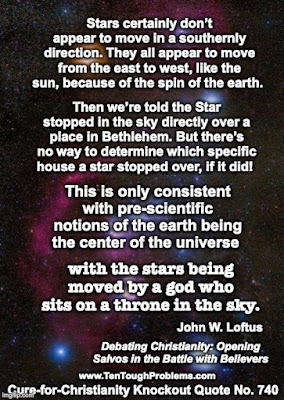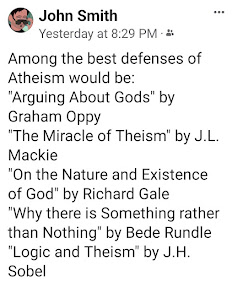"How the New Testament
Writers Used Prophecy" by John W. Loftus.
One of the major things claimed by the New
Testament in support of Jesus’ life and mission is that Jesus fulfilled Old
Testament prophecy (Luke 24:26–27; Acts 3:17–24). If God cannot predict the
future as time moves farther and farther into the distance, as I questioned
earlier, then neither can any prophet who claims to speak for God. As we will
see with regard to the virgin birth of Jesus, none of the Old Testament
passages in the original Hebrew prophetically applied singularly and
specifically to Jesus. [In chapter 18, "Was Jesus Born of a Virgin in Bethlehem?"]. Early Christian preachers simply went into the Old
Testament looking for verses that would support their view of Jesus. They took
these Old Testament verses out of context and applied them to Jesus in order to
support their views of his life and mission.9
Chapter 13: The Bethlehem Star, by Dr. Aaron Adair, in Christianity in the light of Science: Critically Examining the World's Largest Religion (Amherst, NY: Prometheus Press, 2016): 297-313. [Used with permission].
About two
centuries ago, there was a major transition in the way scholars were
approaching the stories of the Bible, both the Old and New Testaments. There
was a greater attempt to look at the historical context and formation of the
holy book and its stories, and the tales of Jesus were a major issue for
critical scholars and theologians. It was also at around this time that the
acceptability of wondrous stories was not palatable, at least for the educated
where a deistic god was more ideal, one that did not perform miracles and was consistent
with the universe of Newtonian mechanics. A naturalistic understanding of the
world, inspired by the success of the physical sciences, along with inspiration
from Enlightenment thinkers, changed the way people looked at the world, and
that caused for a significant reassessment of the spectacular stories of the
ancient world. What was one to do with the miracle stories of Jesus if miracles
don’t happen? The solution was a series of rationalizations, none seen as
terribly plausible but preferable to claiming a miracle or a myth. For example,
Jesus walking on water was a mistake on the part of the Disciples, seeing their
master walk along the beach shore on a foggy morning and not actually atop the
water. Even the resurrection of Jesus was so retrofitted into scenarios that
are unlikely, to say the least, but at least they weren’t impossible.

[First Published 8/3/21] I'm posthumously posting six chapters from an unfinished book sent to me for comment in 2008 by the late John Beversluis (see Tag below). Here is chapter three on "The Genealogies of Matthew and Luke." Do not skip this chapter! It's the most thorough taken-down of the inconsistent, inaccurate, absurd genealogies you will find. It deserves to be studied! I highlighted a few awesome statements of his.
Chapter 2: The Fact of Religious
Diversity
This chapter supports my first contention—that people
who are located in distinct geographical areas around the globe overwhelmingly
adopt and justify a wide diversity of mutually exclusive religious faiths due
to their particular upbringing and shared cultural heritage. This is the Religious Diversity Thesis (RDVT), and it is a well-established fact in today’s world.
The problem of religious diversity cries out for reasonable explanation,
something that faith has not provided so far. Attempts to mitigate it or
explain it, as we’ll see, either fail to take it seriously or explain religion
itself away.
Below I've put together thirty of them that most Christians agree on and why they are all improbable:
1) There must be a God who is a simple being yet made up of three
inexplicable persons existing forever outside of time without a
beginning, who therefore never learned anything new, never took a risk,
never made a decision, never disagreed within the Godhead, and never had
a prior moment to freely choose his own nature.
2) There must be a personal non-embodied omnipresent God who created the
physical universe ex-nihilo in the first moment of time who will
subsequently forever experience a sequence of events in time.
In this debate I'm going to focus on the alleged miracle of the virgin birthed incarnate god. Dr. Slade, of the Global Center for Religious Research, will focus on Mary's apparitions and on testing miracles in general. I'm told this will be a two hour program.
IS RELIGION COMPATIBLE WITH SCIENCE? by Dr. David Eller (pp. 257-278). [This is a 4000 word excerpt out of 8600 words. Get the book!]

In most of the squabbles between religion and
science, religion is never defined, because, since most of the squabbles are
occurring in majority-Christian societies, the assumption is that “religion”
means “Christianity.” Worse yet, the assumption is usually that “religion”
means “traditional Christianity” or “evangelical/fundamentalist Christianity.”
Substituting one of these terms for “religion” in our original question yields
the highly problematic inquiry: Is traditional/evangelical/fundamentalist Christianity
compatible with science?
The first problem, of course, is that even if it is
not, then perhaps some other form—some modernist or liberal form—of
Christianity is compatible with science; perhaps
Christianity can be adjusted and juked to fit with science. The second and more
profound problem is that even if traditional/evangelical/ fundamentalist
Christianity or any version of Christianity whatsoever is not compatible with
science, perhaps some other religion—say, Hinduism or Wicca or ancient Mayan
religion or Scientology—is. Yet you will notice that almost no one asks, and
almost no one in the United States or any other Christian-dominated society
cares, whether Hinduism or ancient Mayan religion is compatible with science,
since few people know or care about Hinduism or ancient Mayan religion. The
tempest over religion and science is thus quite a local and parochial brouhaha,
people fighting for their
particular religion against
(some version or idea of) science.
Wow! Christians nabbed another atheist based on faulty perceptions.
[First published on 10/5/20] Because this is the haunted month of Halloween
here's something to spook ya all!
I'm always interested in new angles to argue my case
against Christianity. Kris Keys does that in the excellently researched
essay below. He argues there is more evidence for the resurrection of
Vampires and Revenants than there is for the resurrection of
Jesus.
Introductory comments by Kris Keys:
Well this is my first time writing a blog post and little
did I know it would be for the website Debunking Christianity!! I find
this to be completely hilarious as I am not in of myself militantly
opposed to Christianity in of itself; I tend to dislike Evangelicals but
that is because I view them as hypocritical and blatantly power hungry
but of course this description would not apply to all Christians. As
probably the readers of this post have deduced by now I am not a
Christian, but I am also not an atheist either. I tend to be rather
eclectic in my views. I fancy myself to be broad minded and open to
change.
I am a schoolteacher by profession, and I have taught both social
studies and science at the high school level. I have dual degrees in
both fields. In my not remotely enough spare time I enjoy reading
folklore, Medieval history, sociology, anthropology and other subjects.
Basically a lot of stuff. Over the years I have heard the
Christian argument for the physical resurrection of Jesus and at one
time I found this argument to be convincing, but more and more for many
varied reasons I became rather skeptical of it.
None of this explains though, how this essay came about! Nothing
remarkable about it really. I was scrolling through Facebook and I saw
John Loftus’s profile. In discussion with him I mentioned that one could
use the resurrection argument to demonstrate the existence of vampires
and I showed him a response I wrote to a friend of mine on this.
John asked me to do a write up
for him.
So here is a write up I never seriously figured I would write up on a
blog, one that I never suspected I would write for. So I hope everyone enjoys
it. So without further ado, here is my attempt to show that the
Christian argument for the resurrection of Jesus would also demonstrate
vampires exist. I will leave it up to you dear readers to determine if
Jesus rose from the dead and if you need to invest in crucifixes and
garlics now; or that perhaps claims of the dead returning bodily just
should not be given the benefit of the doubt. You decide.
I am a follower of John Smith at Facebook, who writes some very good provocative stuff. This Facebook post of his to the left provokes some thought too. He suggests a few works he considers to be the best defenses of atheism. They are all sophisticated philosophical treatises.
Sure, I'm a gadfly, but there are people who think the best atheist arguments come from atheist philosophers. Who or what is the source of this ignorance? Where does it come from? I think it comes from Christian philosophers themselves, because it can and does serve as a red herring leading people away from some powerful atheist arguments.
When I show up and offer a different perspective they treat me with a touch of tribalism, and/or they ignore me. It doesn't have to be that way. There is room for all types of argumentation from Biblical/Religious scholars and especially scientists.
Alex Pinkney graded philosophical arguments, since apparently, he considers them the best that atheists have to offer. He wrote:
Watch this then think, we don't even have an eyewitness of the resurrection of Jesus:
The traditional argument from evil claimed that God
was incompatible with any amount of suffering, for God could, and would want
to, prevent every instance of it. Most philosophers nowadays regard that as too
strong. A certain amount of suffering might be allowed by God, provided there
is a morally sufficient reason for his allowing it—provided, in other words,
the suffering serves some greater purpose or is the unavoidable consequence of
something that justifies its existence. For instance, it may be that our having
free will is a great good which more than compensates for any evil actions
resulting from that freedom. Or it may be that certain types of suffering are
the only way to bring about something of immense value. As an example of the
latter, it is possible that in order to freely develop into the sort of beings
that God wants us to become, we must first overcome certain challenges—and
these may include disappointments, feelings of frustration, and other
experiences we would prefer not going through. (As some theists put it, God’s intention
was not to create a paradise in which to keep us perfectly happy, but to create
a place where we can grow and develop into persons worthy of spending eternity
with him.) It is also possible that an instance of suffering today is the least
terrible means of preventing a far greater amount of suffering at some future
date. Each of these, as well as several other possibilities that will be
discussed below, provides a conceivable explanation for at least some of the
bad things that happen in this world.
But
even if God is not incompatible with all suffering, he is incompatible with
suffering that cannot be justified by some outweighing benefit. Such suffering
would be senseless or gratuitous, and if we are to take seriously the claim
that God is perfectly good as well as all-powerful and all-knowing, we cannot suppose
that he would let someone suffer without reason. If one has the ability to
prevent such pointless suffering, yet fails to do so, one cannot be considered
morally perfect. It follows that there can either be a God, or there can be
senseless suffering, but not both. This leads to a very simple argument in
support of atheism:






















